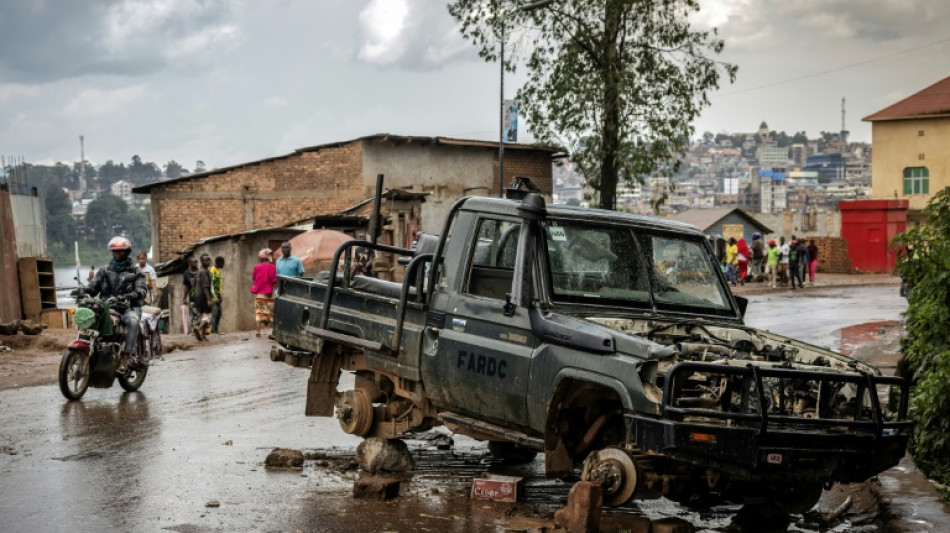
-
 Rubio defends Russia talks and criticism of Zelensky
Rubio defends Russia talks and criticism of Zelensky
-
Only one in six Japanese citizens has a passport, data shows

-
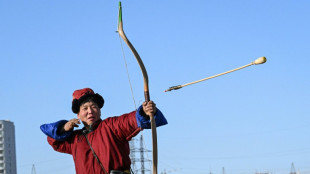 Mongolians warm up on culture at new winter festival
Mongolians warm up on culture at new winter festival
-
Asian markets advance as Alibaba fuels Hong Kong tech rally

-
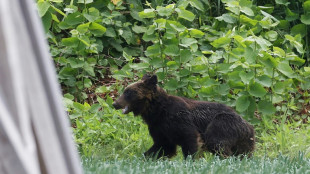 Japan cabinet approves 'emergency' urban bear shootings
Japan cabinet approves 'emergency' urban bear shootings
-
Australia says China warned of 'live fire' drill off east coast

-
 Pakistan face India in Champions Trophy clash with no room for error
Pakistan face India in Champions Trophy clash with no room for error
-
Nepal community fights to save sacred forests from cable cars

-
 Trump tariffs leave WTO adrift in eye of the storm
Trump tariffs leave WTO adrift in eye of the storm
-
'Just two glasses': In Turkey, lives shattered by bootleg alcohol

-
 Nissan shares jump 11% on reported plan to seek Tesla investment
Nissan shares jump 11% on reported plan to seek Tesla investment
-
LeBron, Reaves dazzle as Lakers sink Blazers

-
 Cambodia to resume demining after US aid waiver
Cambodia to resume demining after US aid waiver
-
Canada enjoys emotional win as USA gets Olympic motivation

-
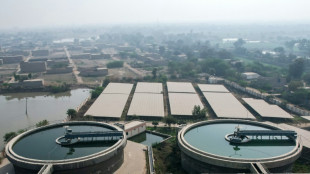 Trump aid cut imperils water scheme in scorching Pakistan city
Trump aid cut imperils water scheme in scorching Pakistan city
-
Monaco battle to save season after Champions League exit

-
 Barcelona face Las Palmas with Liga lead strength test beckoning
Barcelona face Las Palmas with Liga lead strength test beckoning
-
Just 17% of Japan citizens hold passport, data shows

-
 Canada beats USA to win heated Four Nations Face-Off final
Canada beats USA to win heated Four Nations Face-Off final
-
Netanyahu orders 'intensive' West Bank operations after Israel bus blasts

-
 Macario back to scoring ways as USA beat Colombia
Macario back to scoring ways as USA beat Colombia
-
Australia's Cummins targets IPL for return from injury

-
 Most Asian markets rise as traders pick over week of headlines
Most Asian markets rise as traders pick over week of headlines
-
US sends migrants from Guantanamo to Venezuela

-
 Japan's core inflation rate hits 19-month high
Japan's core inflation rate hits 19-month high
-
Trump aid cut imperils water scheme in Pakistan's hottest city
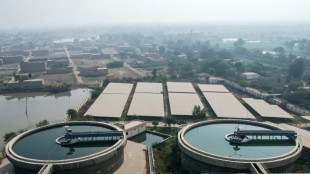
-
 Big-gun Wallabies 'add energy' to Brumbies' Super Rugby campaign
Big-gun Wallabies 'add energy' to Brumbies' Super Rugby campaign
-
Bus blasts rock central Israel in 'suspected terror attack'

-
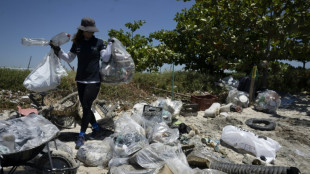 Fishermen, sailing champions clean up trash-covered Rio island
Fishermen, sailing champions clean up trash-covered Rio island
-
What is Brutalism? And why do architects hate 'The Brutalist'?

-
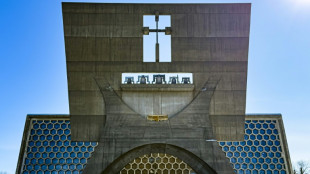 How a 'forgotten' Minnesota monastery inspired 'The Brutalist'
How a 'forgotten' Minnesota monastery inspired 'The Brutalist'
-
People can spread bird flu to their cats, US study suggests

-
 Blues coach braced for 'extremely competitive' Super Rugby season
Blues coach braced for 'extremely competitive' Super Rugby season
-
Liverpool face wounded Man City as Premier League title race heats up

-
 Wallabies skipper Wilson extends Reds deal till 2029
Wallabies skipper Wilson extends Reds deal till 2029
-
Dodgers pitcher checked for concussion after head-shot

-
 Musk vows to 'fix' X feature over Ukraine and Zelensky
Musk vows to 'fix' X feature over Ukraine and Zelensky
-
Japan's core inflation rate hits 3.2% in January

-
 Chainsaw-wielding Musk savors Trump's return to White House
Chainsaw-wielding Musk savors Trump's return to White House
-
Trump meets with Tiger, PIF and PGA Tour bosses to reunite golf

-
 Roma reach Europa League last 16 as 10-man Ajax scrape through
Roma reach Europa League last 16 as 10-man Ajax scrape through
-
MLS hoping for World Cup buzz in 30th season

-
 Bolivia's Morales launches 4th presidential bid, defying term limit
Bolivia's Morales launches 4th presidential bid, defying term limit
-
Harris Reed opens with 'rebellious' show at London Fashion Week opening

-
 Stocks mostly fall on tepid Walmart outlook, geopolitical worries
Stocks mostly fall on tepid Walmart outlook, geopolitical worries
-
Argentine court dismisses charges against 3 accused in death of singer Liam Payne

-
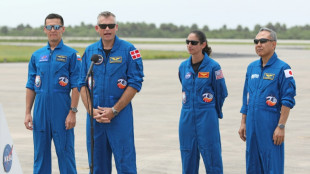 Musk in X spat with Danish astronaut over 'abandoned' ISS crew
Musk in X spat with Danish astronaut over 'abandoned' ISS crew
-
Bond franchise shake-up moves spy into Amazon stable

-
 New York seeks hundreds of millions of dollars in 'vaping epidemic' case
New York seeks hundreds of millions of dollars in 'vaping epidemic' case
-
Dybala double leads Roma into Europa League last 16


Burundi, Uganda manoeuvre as DR Congo violence spreads
Countries bordering the eastern Democratic Republic of Congo sought to shore up defences on Wednesday as violence spreads through the region, with Burundi forced to pull back troops and Uganda securing a key city.
There are fears the escalation of fighting between troops and militias in the vast mineral-rich region could trigger a repeat of the devastating Congo wars of the 1990s and 2000s that drew in multiple countries and left millions dead.
The latest escalation follows the rapid advance of the Rwanda-backed M23 armed group, which has seized vast tracts of the eastern DRC in recent weeks including the key cities of Goma and Bukavu.
The M23's southward march has threatened the small, landlocked country of Burundi in particular, with senior army and government sources telling AFP of deadly clashes that have forced its troops back across the border.
Burundi had more than 10,000 troops assisting the Congolese army against the M23, while also hunting down Burundian rebel groups based in the region.
"We had erected a defensive line in Kamanyola to try to stop the advance of the M23 and Rwandan soldiers, but we had to make a tactical withdrawal under enemy attack yesterday (Tuesday)," a senior officer told AFP on condition of anonymity.
Burundi's army spokesman denied any retreat, posting on X that its forces were "continuing to execute their missions in their areas of responsibility".
But sources told AFP that its soldiers were no longer in their usual positions in the areas of Luvungi and Sange on the Congolese side of the border.
Some "have been forced to retreat... while suffering losses... They arrive hungry and without any ammunition because they have not been resupplied for a while," said a Burundian official, also speaking anonymously.
- Executed children -
As the M23 has advanced, the violence has killed thousands while displacing hundreds of thousands fleeing the fighting.
The United Nations on Tuesday said the M23 had summarily executed children after entering Bukavu last week and that "children were in possession of weapons".
The violence has prompted a rebuke from Rwanda's long-time ally Britain, which summoned Rwanda's top envoy to London in response.
Rwanda denies direct military involvement, but UN experts said last year that it had some 4,000 troops operating alongside the M23 and had de facto control over the group.
The Congolese government accuses Rwanda of "expansionist ambitions" and says it is stealing vast amounts of valuable minerals.
With Goma and Bukavu under its control, the M23 now has total control of the vast Lake Kivu that sits between the two cities.
Their dominance has brought some semblance of calm to the war-torn region, with boat rides across the lake resuming on Tuesday.
"We are happy, this decision gives us some relief," Lueni Ndale, a worker at a local shipping company, told AFP of the move to restore services.
- Uganda secures city -
Meanwhile, further north, Uganda said it had moved its soldiers into Bunia, capital of Ituri province.
Uganda already had thousands of troops in the province under an agreement with Kinshasa, and said it was responding to "massacres" by local militias.
Dozens of militias operate in the eastern DRC, feeding off illegal mines and a security vacuum left by the weak and corrupted Congolese military, analysts say.
A senior analyst at South Africa-based consultancy Signal Risk, Daniel van Dalen, said the situation involving Uganda was not directly related to what was happening with the M23 and Burundi further south.
The Ugandan move was "a very localised issue," he told AFP.
But with various other groups involved in unrest in the region, he said, "Uganda is worried about a spillover into its territory and it's willing to help out."
Analysts fear that the latest unrest could lead to a repeat of the situation in 1998 when Uganda and Rwanda backed rebel groups in the eastern DRC after falling out with the Congolese government.
That triggered the Second Congo War, which lasted until 2003.
Sometimes dubbed "Africa's World War", the conflict drew in multiple African countries and resulted in millions of deaths from violence, disease and starvation.
burs-er/sbk
K.Brown--BTB
